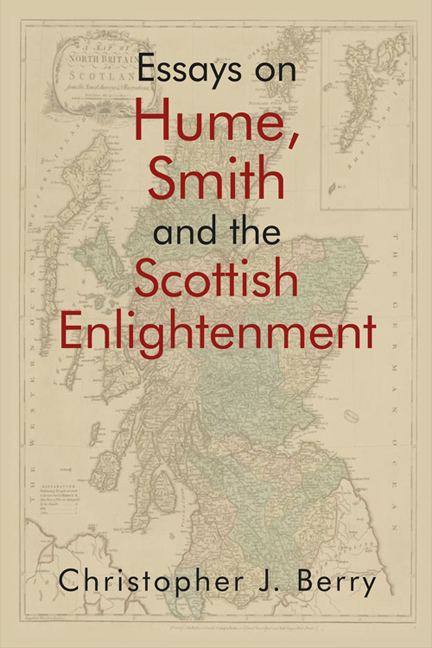8 - Finding Space for Civil Society in the Scottish Enlightenment
Published online by Cambridge University Press: 06 May 2021
Summary
One of the themes in this volume and in my books has been that the Scots were ‘social’ theorists. In this chapter I explore an aspect or corollary of that theme. More exactly, I develop an argument that the Scots established what I call a conceptual space that becomes in later thought termed civil society. I do not claim to provide either a definitive or an exhaustive exploration; rather, I suggest or intimate how some aspects of the Scots’ thinking can be interpreted to map the contours of that space. That this is not an altogether fanciful or idiosyncratic enterprise is borne out by a raft of commentary that makes links between the Scots and civil society. I do not directly engage with this literature so much as take its presence as a pretext for my own independent cartography.
To comment briefly on the term itself, the notion of ‘civil society’ is both ancient and modern. In modern times it came to particular public notice during the transitional events in Eastern Europe, especially in Czechoslovakia and Poland, before and after 1989 and, more recently, in and around the notion of the ‘Arab Spring’ and whether affected countries could experience a successful transformation to ‘democracy’. This stimulated academic discussion about the term's meaning and provenance. It is fair to say that specific agreement on its meaning is lacking but there is a rough consensus, which is sufficient for my purpose here. Regarding its provenance or history, this has been traced back by Antony Black (1984), though not I think very securely, to at least the Middle Ages, although there was an extensive debate on the relationship between societas civilis perfecta and imperfecta. Nevertheless, there is consensus that the contribution of Hegel was decisive. This is partly (though by no means entirely) attributable to two contingent factors. First, Hegel influenced Marx who, in his early writings particularly, contested Hegel's conception of civil society. Second, the East European debates took place in regimes where Marxism remained the official state ideology.
- Type
- Chapter
- Information
- Essays on Hume, Smith and the Scottish Enlightenment , pp. 124 - 142Publisher: Edinburgh University PressPrint publication year: 2018



